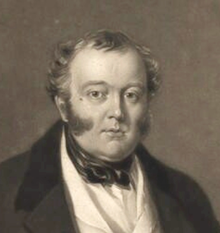
Back جورج هدسون Arabic جورج هدسون ARZ George Hudson Italian ジョージ・ハドソン Japanese George Hudson Polish George Hudson SIMPLE
George Hudson | |
|---|---|
 | |
| Lord Mayor of York | |
| In office 1846–1847 | |
| Monarch | Victoria |
| Preceded by | William Richardson |
| Succeeded by | James Richardson |
| In office 1837–1839 | |
| Preceded by | James Meek |
| Succeeded by | William Stephenson Clark |
| Member of Parliament for Sunderland | |
| In office 1845–1859 | |
| Personal details | |
| Born | 10 March 1800 Howsham, East Riding of Yorkshire, England |
| Died | 14 December 1871 London, England |
| Political party | Tory |
| Spouse | Elizabeth Nicholson |
| Occupation | Politician |
| Nickname | The Railway King |
George Hudson (probably 10 March 1800 – 14 December 1871) was an English railway financier and politician who, because he controlled a significant part of the railway network in the 1840s, became known as "The Railway King"—a title conferred on him by Sydney Smith in 1844.
Hudson played a significant role in linking London to Edinburgh by rail, carrying out the first major merging of railway companies (the Midland Railway) and developing his home city of York into a major railway junction. He also represented Sunderland in the House of Commons. Hudson's success was built on dubious financial practices and he frequently paid shareholders out of capital rather than money the company had earned.
Eventually in 1849, a series of enquiries, launched by the railways he was chairman of, exposed his methods, although many leading the enquiries had benefited from and approved of Hudson's methods when it suited them. Hudson fell a long way, becoming bankrupt. After losing his Sunderland seat he was forced to live abroad to avoid arrest for debt, returning only when imprisonment for debt was abolished in 1870.
Hudson's name is associated with financial wrongdoing, although others were at least partially guilty of similar practices. He never named any of his co-conspirators, although many of them turned their backs on him when the bubble burst.